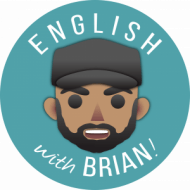Do you know the difference between an “active vocabulary” and a “passive vocabulary”?
- Listen to learn about improving your vocabulary.
- First, try listening without reading the transcript. After that, listen again to check for any words you might’ve missed.
- You’ll also find a quiz at the end!
Transcript:
Have you ever been in class and your teacher asks you a question, and you know the answer….it’s on the tip of your tongue…but it just won’t come out? You know exactly what you want to say, you know there IS a word for it. You’ve seen the word before. You’ve heard it 100 times. But you just can’t remember?
In this episode, we’ll be talking about why this happens and how you can avoid this frustrating experience. Stay tuned.
What is an “active” or “passive” vocabulary?
When it comes to learning vocabulary, it is often said that by learning 1000 common words in a language, you can understand more than half of everything that is said in that language. By learning around 3000 of the most used words in a language, you should be able to understand almost everything said in that language.
However, learning vocabulary isn’t as simple as memorizing lists of words or repeating phrases over and over again. When speaking about languages, we use the terms, receptive and productive. Receptive skills include things like listening and reading, where you are passively picking up language. Productive skills include things like speaking and writing, where you are actively using the language. So you can think of your vocabulary in two parts. First, your active vocabulary and second, your passive vocabulary.
So, in other words, your active vocabulary consists of words that you are comfortable using and use frequently. While your passive vocabulary consists of words that you may have read or heard before but don’t often use. For example, you probably don’t have trouble speaking about yourself or your job because you’ve had to introduce yourself in English so many times. However, when your teacher wants you to give your opinion about the pandemic you have trouble forming sentences because you don’t usually talk about things like viruses, vaccines, and scientific data. Your passive vocabulary is much larger than your active one.
Use it or lose it! We forget vocabulary that we don’t use frequently.
How can you move words from your passive to active vocabulary?
Great, so we all have two vocabularies. How is knowing this going to help you? Alright, so let’s talk about some ways we can start transferring words from our passive vocabulary into our active one.
- So, the first tip I have for you is writing. I am always encouraging my students to write for this very reason. When we’re speaking, we use common words. We don’t have an opportunity to practice advanced vocabulary in daily conversation because it sounds inappropriate or unnecessary. If you ask me, “how are you?” I’ll probably reply with “I’m fine, nothing new, the usual”. I probably wouldn’t say, “I’m utterly exasperated by my coworker!” When you write, you are given a chance to practice using words that otherwise would stay locked in your passive vocabulary.
- Secondly, you need to move beyond your comfort zone when speaking. I had a student who loved to speak about the same topic, over and over again. He would tell the same stories so frequently that it was like he was reading from a script. Like an actor in a play. We often feel nervous when speaking in a foreign language. So, we like to be safe. We like to talk about the things we know and the things we’ve talked about before, again and again. This is why I always try to get my students to speak about things that they don’t know much about. If you’re an artist, try speaking about science and mathematics. If you’re an engineer, try speaking about psychology and religion. By pushing yourself beyond the limits of what you’re comfortable speaking about, you’ll start moving more words into your active vocabulary.
- My final tip is to use your teacher as a testing ground. When you’re in class, it is the perfect time to experiment. Did you learn a new word last week? Do you want to try a difficult grammar structure? Do you want to replace a word in your essay with something less basic? Your teacher will be able to tell you if it works or if it doesn’t. We often don’t use more difficult vocabulary because we are unsure. Does this sound strange? Did I pronounce it correctly? Does this sentence even make sense? Try to put those anxieties aside and begin to experiment with these words you haven’t mastered yet. If you’re willing to do the work, you’ll definitely see the results.














